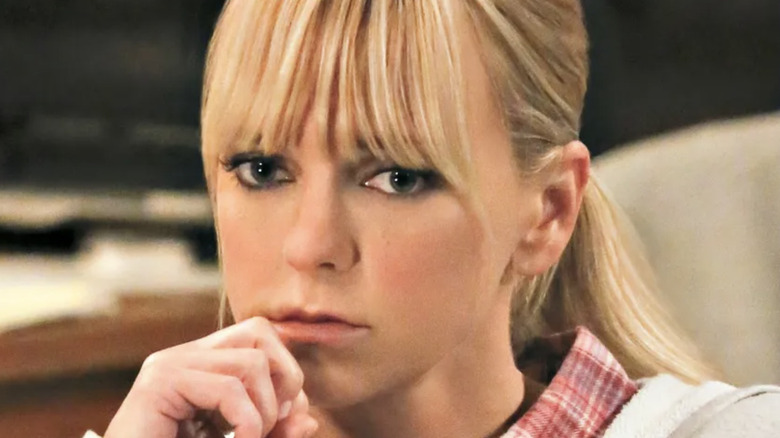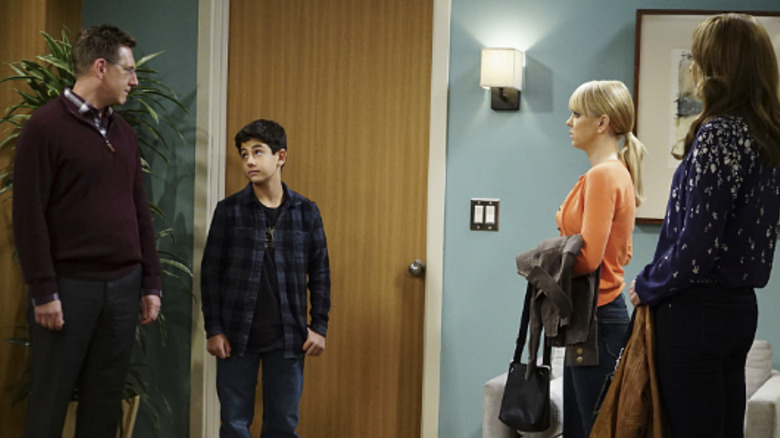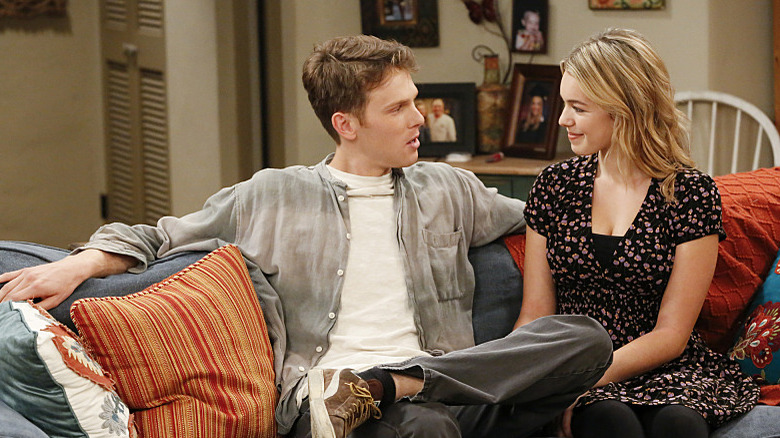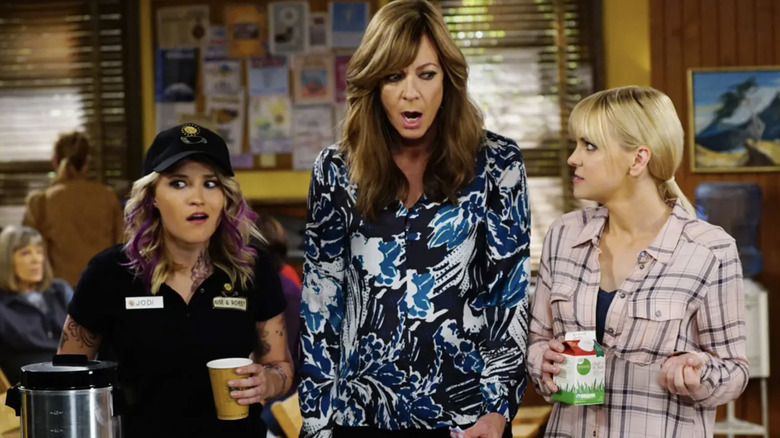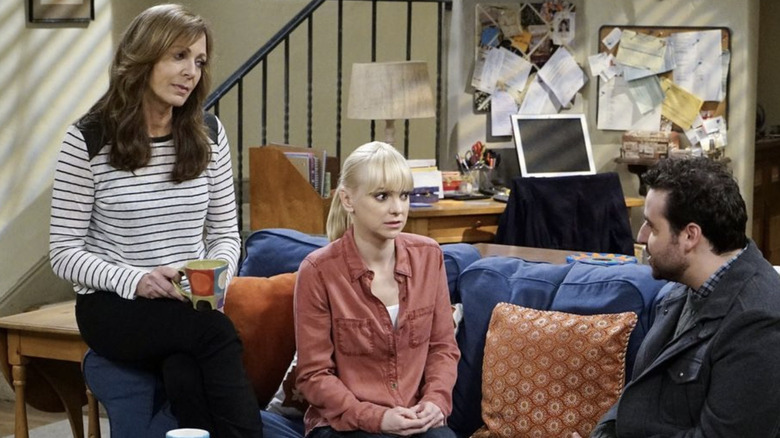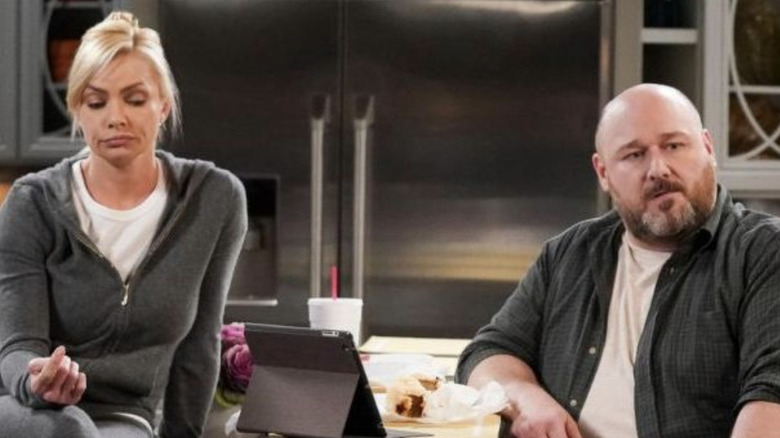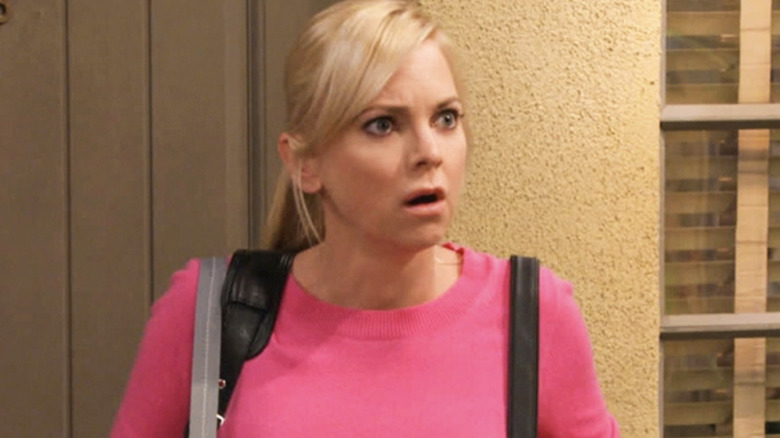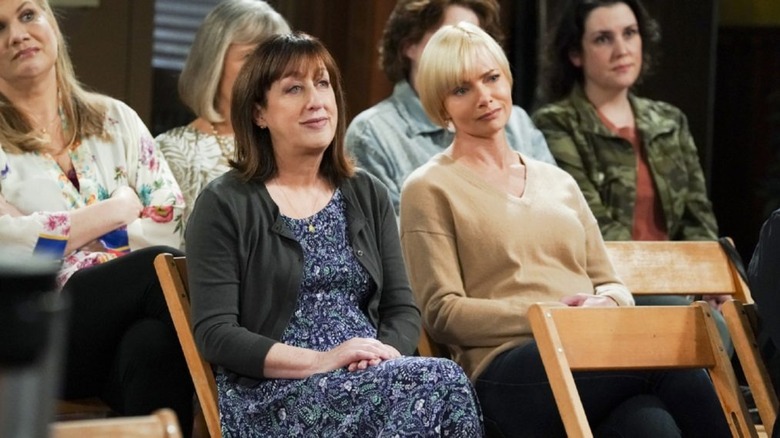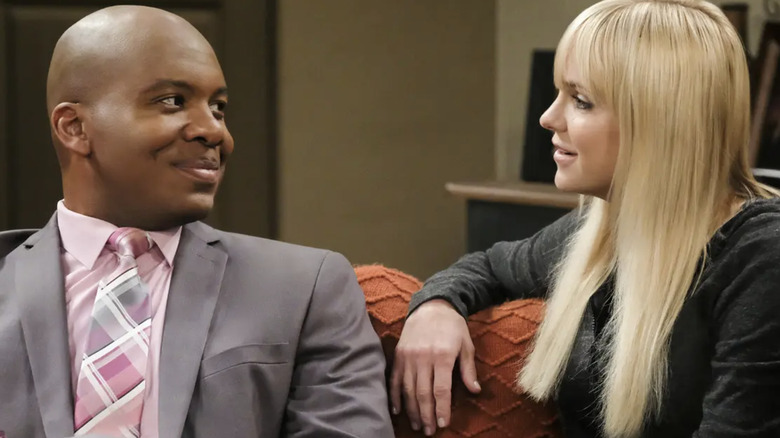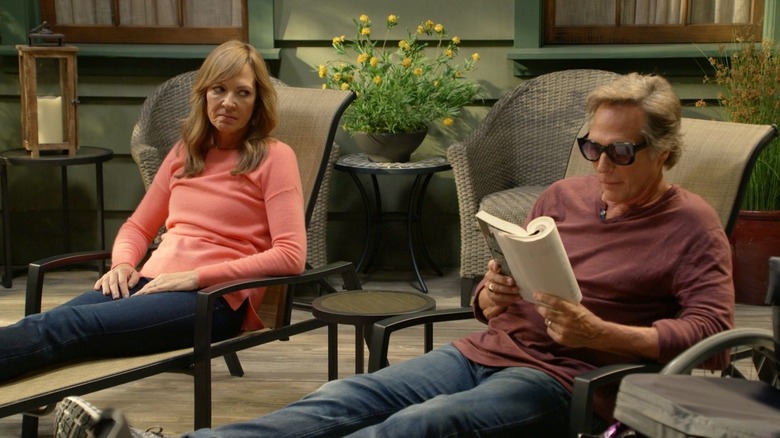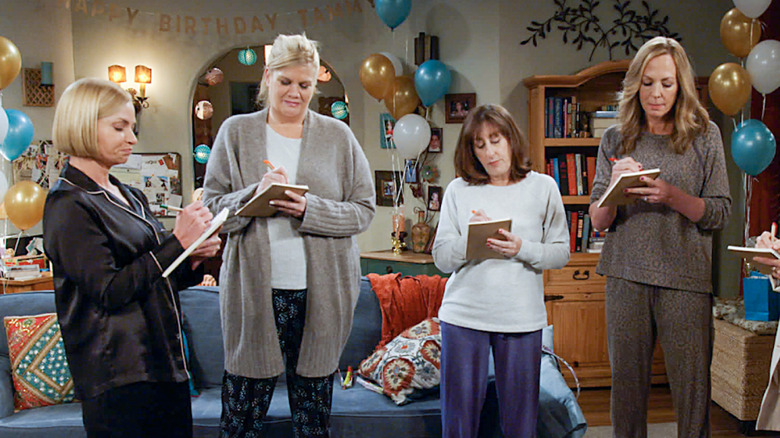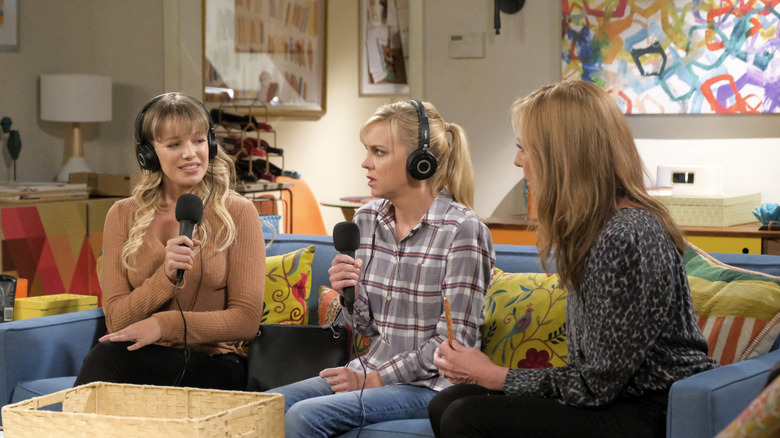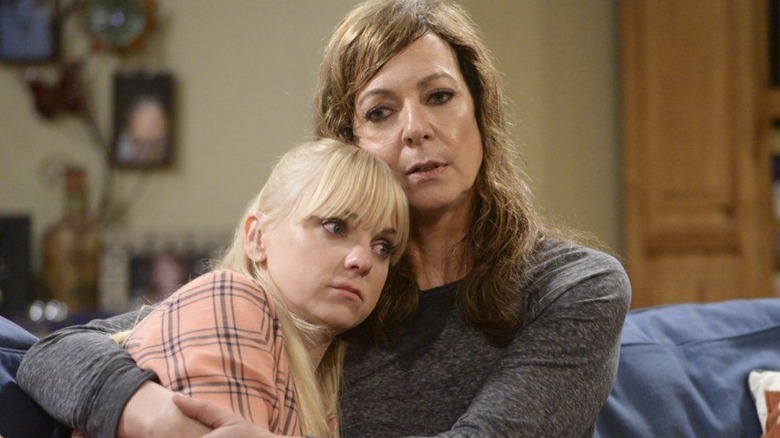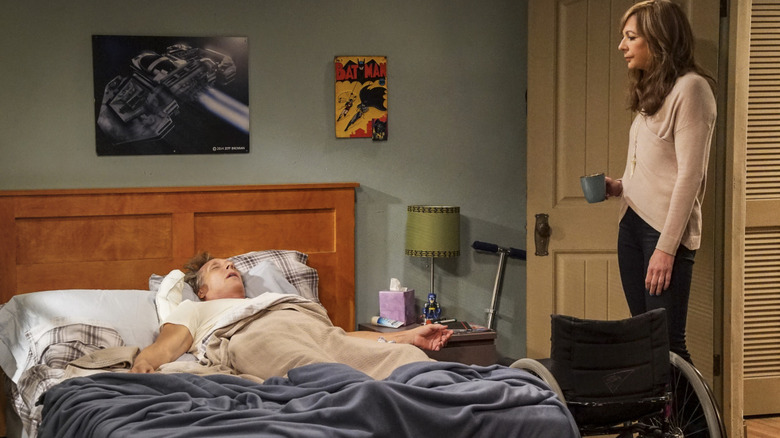Questionable Things We Ignore In Mom
Although Anna Faris and Allison Janney's CBS series is titled "Mom," there's little to no actual parenting in the show. The fractured relationship between Faris' character Christy and Janney's Bonnie is clearly the series' focus, but from episode to episode, Christy reenacts family history by largely ignoring her children. In fact, most of the shadier aspects of the show stem from this core issue. The subject is rarely addressed, making it that much harder to maintain a suspension of disbelief.
Ironically, this show — which hinges on addiction and alcoholism — also has some conflicting messages regarding the non-AA characters who should probably join the Plunketts at a meeting. Of course, that's not to say that much of the show isn't a spot-on representation of what it's like to live with or love someone who struggles with addiction. The series handles the sensitive nature of the subject quite well and depicts a strong group of women who are always there for each other. Still, though "Mom" has plenty of believable and hard-hitting storylines, it's difficult to look beyond the following questionable character behavior and unresolved storylines.
Mom without the mom-ing
It's established that Christy's brand of parenting isn't stellar, but she's sober, without a single relapse throughout the show (except when she accidentally eats Adam's pot brownie). Despite staying clean, Christy never quite gets her life together. She's consistently negligent regarding her kids, so it's not surprising that her son Roscoe wants to live with his father.
Of course, Roscoe's dad, Baxter, isn't winning any parenting awards, either. He does clean up his act when he marries Candace, though she's condescending and challenging in her own right. After moving in with his dad in Season 2, Roscoe stops appearing altogether in early Season 4. Variety summed up co-creator Chuck Lorre's reasoning for cutting the kids out of the show with the sentiment, "Although Lorre calls it 'very difficult' to write out the two youngest members of the family to refocus the series, he felt it was necessary to achieve the results they were truly after."
While the decision works for the series and its found-family approach, the choice is never quite explained believably onscreen. Violet moves away, which is reasonable, but it's hard to buy that Christy wouldn't see or talk about her son more often. Her biggest reason for getting sober was to be a better mom, so a short one-way phone call, a cameo here and there, or even mentioning Roscoe would go a long way to establish that she didn't just abandon her kid. Hell, even Baxter shows up for cameos after Roscoe is gone.
Violet's problem goes unsolved
By Season 2, Violet is well on her way to following the Plunkett family legacy of alcohol and substance abuse after the adoption of her baby. She's often seen stumbling back into her room after a late night of partying, and Christy doesn't do nearly enough to talk to her daughter about what can happen when you use alcohol to numb your pain. One of the most significant themes in the show is that you can't force someone to admit that they have a problem before they're ready — and that only someone can decide for themselves whether or not they have a problem.
While that's helpful advice, you can support someone without dragging them kicking and screaming to AA. Both Bonnie and Christy see Violet's destructive drinking pattern emerge, but they immediately stop bringing it up after Violet pushes back. Neither Mom nor Grandma tries to have their sponsor Marjorie attempt to talk to Violet or slip her any resources on the subject. It would even be helpful for Violet to attend Al-Anon (a group for families of alcoholics) meetings because she understandably has some significant trauma left over from Christy's alcoholic days.
Perhaps attending Al-Anon meetings could spark a realization that Violet is heading down the same path. It's easier for self-realization to happen on your own terms rather than feeling cornered by the very people you felt abandoned by in the first place. It seems like Christy and Bonnie do the bare minimum to help Violet, putting way more effort into helping young people they meet at AA.
A mom to everyone but their kids
Jodi is the most significant example of Christy's efforts to help other young people with their addiction. Jodi is a lot like Violet: She's sarcastic, pushes boundaries, and has a rebellious streak. It's clear that she's a placeholder for Christy's daughter. While Christy takes little to no action to help Violet, she spends countless hours walking Jodi through the program, navigating her fractured family situation, and getting her back on track after relapses, even when she's resistant.
There's no denying that Jodi's death by overdose is the most sobering, saddest moment in the series, but not even the tragic loss of a young girl is enough of a wake-up call for Christy to make more of an effort with Violet (and, later, Roscoe, who starts smoking pot in middle school and could be headed down a similar path to get attention and punish his mom).
Even worse, Christy's efforts with Jodi and the other women she sponsors prove that she's capable of doing more for Violet and Roscoe, but her priorities are out of whack.
Violet and the creepy professor
When your teenage daughter decides to date a middle-aged professor, it might be time to step in. After Violet breaks the news to Christy that she's hooking up with her professor, Christy is understandably shocked and opposed to the union. Violet gave up her daughter to make a life for herself and go to college, but her predatory relationship with Gregory ultimately leads to her dropping out of school and making a slew of bad choices.
Christy and Bonnie try to put a stop to the relationship, but they let an 18-year-old convince them to make peace with Gregory in a desperate bid to get Violet to stop hating them. Sorry, but being the parent to a teenager typically means being disliked. Violet's relationship with Gregory is both creepy and destructive — especially when he tries to pressure the teenager into having another baby while she's actively still processing the trauma from her teen pregnancy.
But Christy's desperation to be liked often prevents her from being a good mom. She should have reported Gregory's actions to the school and done more to stop the relationship. Luckily, it falls apart on its own when Gregory decides that he doesn't want to date someone young enough to be his daughter because, lo and behold, she's a teenager who's still immature.
A rocky relationship
Let's face it: Jill and Andy are a bit of a mismatch. Beyond the fact that Jill constantly talks down to Andy about his appearance and income, neither party properly communicates their needs and wants — especially toward the end of their first go of things. Andy walks out on Jill out of nowhere with little more than a fight that comes out of the blue. He gets wigged out at how serious they're getting, despite being the one to initiate most of that seriousness, and says he's not ready for a kid.
To make matters worse, Jill begins actively stalking him by following him and his new girlfriend in a desperate attempt to win him back. Then, with barely a conversation, they reconcile after randomly witnessing a bank robbery together. None of the issues that caused the breakup are addressed, and they try and succeed in getting pregnant almost immediately after their reconciliation. Though the writers clearly wanted to send her off with a happy ending, it would have been more satisfying for her to start fresh with a healthier relationship or at least hash things out more plausibly.
A collegiate exit
There's not much a series can do when its lead decides to depart, especially when it's a last-minute decision. Anna Faris decided to leave "Mom" right before what ended up being the show's last season. Of course, not giving notice prevented the showrunners from giving Christy a planned onscreen exit. Being the star of a show is no easy task, and actors tend to get held to higher standards than everyone else. Would you expect an accountant to give something like six months' notice before leaving a job? No, but actors are expected to ride a series out at least to a natural stopping point, even if it's no longer the right project for them.
A lot of people were upset with Faris, but everyone has to make the best choice for themselves and their mental health. While there was a real-life reason for Christy's onscreen departure, it doesn't change the fact that Christy's exit from "Mom" makes no sense. Sure, the writers didn't have much choice, but it's hard to believe that Christy would just up and leave her family for Georgetown.
Given the fact that Christy could barely get into the lowest-tier law school, it takes a lot of suspended disbelief to buy that she makes it into Georgetown on a full ride. Between her internship and working to keep the lights on, it's not even her fault that she initially struggles to find her ground. Yet Christy never really finds it before her exit and abandons Roscoe completely. Given that she initially got her life together for her kids' sake, it's hard to empathize with her ditching the one she still allegedly has in her life, though we never see him.
Wendy accepts being an outcast
Christy and Bonnie's close-knit group of AA women are the highlight of "Mom," but not everyone in the group is treated equally. Wendy is the compassionate nurse of the group, but despite her willingness to help anyone who needs it, the group frequently treats her like an unwanted outcast. The brunt of the bad behavior is courtesy of Bonnie, and she seems to inspire the group's nasty treatment of Wendy.
Wendy is soft-spoken and tends to avoid confrontation, but even she snaps about it occasionally — like when Jill's guru gives her a pep talk about speaking her truth. Yet the behavior never seems to change, and Wendy doesn't try to find a new group or hold anyone accountable. The main focus of their AA group is to help keep each other sober, but bullying one of its members seems counterproductive to that goal. Bonnie's constant criticism and snipes about how unimportant Wendy is could easily result in a relapse. While everyone is responsible for their own choices, it's cruel to be so callous to one member of your friend group — especially one whom they seem to keep around solely to serve as a verbal punching bag.
Two peas in an addict's pod
Getting abandoned by your mother is the Plunkett way, and Bonnie's mom was no different. Bonnie began her journey to AA when her mom left her in foster care to a slew of abusive foster parents. And though her mom reaches out toward the end of her life, Bonnie spurns her attempts to reconnect. So, it's not surprising that Bonnie doesn't discover the existence of her half-brother Ray until after her mother's death.
While Ray, a successful lawyer, seems to be the golden child, he has his own demons. It turns out that Bonnie's mom being in her kid's life was just as bad as not being in it at all. Ray struggles with a coke addiction that destroys his marriage and puts his career at risk. Once again, when it comes to the Plunketts' actual family, they do little to help Ray. Sure, Ray is resistant, and you can't force someone into sobriety, but neither Bonnie nor Christy do much to leave the door open for him. Ray completely disappears from the series, and neither Bonnie nor Christy seem concerned as to whether or not he's even still alive. Ray's character arc is left entirely unresolved, and fans don't even know if he survived the series. Regina meets the same open-ended fate early in the series after her relapse.
Adam's alcohol problem
You'd think that with a social group consisting almost entirely of AA members, people wouldn't make a joke about someone's evident alcoholism. Adam and Bonnie have arguably the best (and most entertaining) relationship in the show; from their brand of communication to the physicality of their relationship, they make a pretty good team. Yet more often than not, Adam is plastered, falling-down drunk.
Not only does he make jokes about his constant need for alcohol, but Bonnie and the rest of her crew jump in, too. It's pretty bizarre that not a single person even tries to broach the subject with Bonnie or Adam. In almost every episode, he drinks alone, cracking open tons of beers when upset and saying that he "needs" alcohol.
It's harmful to continually display that kind of behavior around addicts and, even worse, to treat it like a laughing matter. Adam does go to Al-Anon meetings, and even that doesn't shine a light on the fact that he has an unhealthy relationship with booze. He clearly has some issues to work out, and it would be helpful if he got a therapist like Bonnie instead of using a bottle to cope — but it's downright negligent that no one has a discussion with him before things get worse.
Bonnie is a bad friend
Bonnie isn't winning any awards for her friendship skills. Her best friend and former foster sister even forgave her after Bonnie derailed her life, got her kicked out of the home, and essentially led to her long stint in prison. After all of that, Bonnie somehow worms her way back into Tammy's life.
Of course, Tammy isn't the only friend to whom Bonnie is awful. Even during AA meetings, Bonnie consistently cuts her friends off, expresses boredom during their shares, and turns every story back to herself. Majorie makes more than a few quips about Bonnie's selfishness throughout the show, but she and the rest of the group never really hold her accountable for her behavior, even when it's hurtful.
It's bad enough that Bonnie steals her friends' food and inserts herself in every aspect of their lives, but AA is supposed to be a safe space. The whole point is to share your story with an attentive audience. By cutting people off and dismissing their problems, she's actively risking their sobriety. Sure, Bonnie has a significant amount of character growth by the end of the series, but even that barely scratches the surface of decency.
Violet cuts off contact with Christy
The creators of the show may have established that they wanted a child-free show to focus on the AA group, but Violet's exit is almost as baffling as Roscoe's. Sure, moving away is a believable choice for Violet when she tries to discover who she is, but completely cutting her mom from her life the way she does is a little abrupt. The pair are finally on relatively good terms after a few years of sobriety and Violet's move. Granted, even sober Christy wasn't the best mom. On some level, it's believable that distance and self-sufficiency might be enough for Violet's reflection on their relationship.
Yet like most of the storylines surrounding the kids' exit from the show, there's no buildup and little explanation for the plotline. Violet's cameo in Season 6 gives fans some closure, but it still leaves a substantial number of questions. When Christy works on a group project for law school, she discovers that Violet has a podcast detailing Christy's failings as a mother. When Christy confronts Violet, she'll only talk to her if she can use their confrontation in the podcast. It's not entirely out of character, and Violet does seem to be doing well. Their conversation proves beneficial (if possibly temporary) closure for both women, but it still comes out of nowhere and is never addressed again. On the one hand, it's good that Christy respects Violet's request for no contact; on the other, she doesn't seem to be all that affected by it long-term.
Bonnie and Christy avoid accountability
Accountability is a significant early step in AA, but Christy and Bonnie rarely hold themselves accountable for their actions. Instead, they typically blame others for their behavior. Christy is a fully grown adult who constantly uses Bonnie's treatment of her as a kid as the reason her life is a mess. Yet she did the same exact thing with her own children and still blames Bonnie. Bonnie's second sponsor, Nora, is the only character who calls Christy out for her childish behavior, but it's still not enough the fix the behavior.
Despite the Plunkett mother-daughter duo constantly discussing the amends portion of AA, neither of them does much to make up for their mistakes, and no one in the group does much to call them out for it. Christy spends a good chunk of the show's beginning having an affair with her married boss. She never makes amends with his wife and even gives her a pep talk when she comes to Christy worried that he's having an affair. Both women are more than happy to screw with other people's lives and make excuses when it blows up.
Bonnie somehow keeps her job
Bonnie isn't exactly a poster child for a hard worker. Granted, anyone who's lived in a few apartment complexes can probably attest to a negligent super or two. However, Bonnie takes things to a new level by completely fabricating a resumé and doing essentially nothing in her role as the apartment handywoman.
Somehow, she keeps her job through two different building owners, but that's not even the weirdest part. Despite her husband needing a wheelchair to get around, they still live in Bonnie's two-story house, even though it's not accessible. She fibbed her way into this job with no experience, and now she actually has some, but she doesn't even try to look for another live-in super position somewhere where her boyfriend isn't cut off from living in half of the apartment. The issue comes up less than a handful of times. Bonnie's lack of effort to remedy the situation is baffling. The job market is brutal, but there's a difference between not being able to find a new job and not bothering to try to make things easier for your partner. Eventually, she and Tammy start their own business, but who knows when, or if, they'll move somewhere better for Adam.
